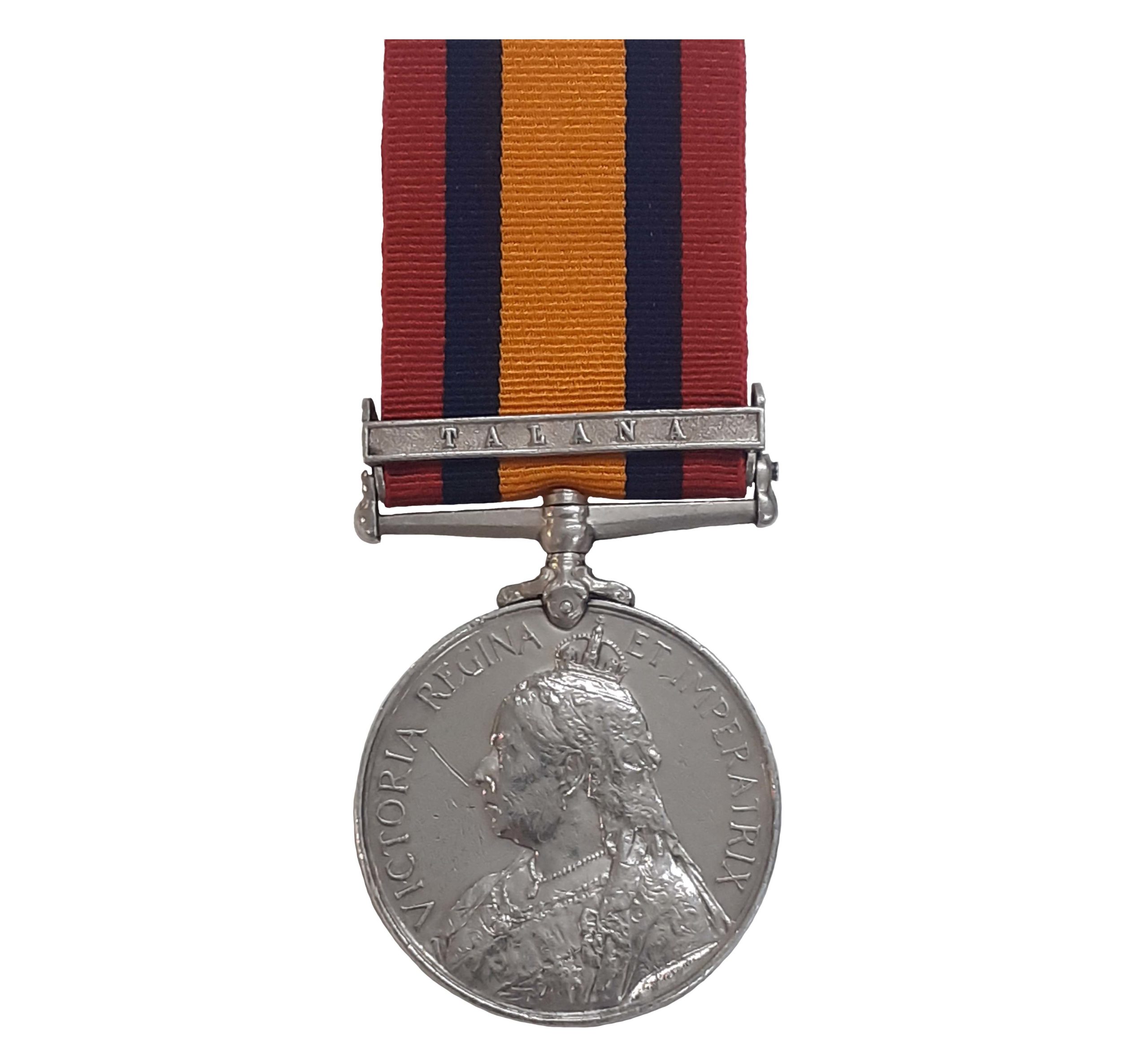Description
A Rare Boer War Casualty Medal for the battle of Talana awarded to Private, later Quarter master Sergeant Thomas Downes 1st Battalion King’s Royal rifle corps, who was wounded on the 20th of October 1899 at the battle of Talana and Mentioned in Despatches in 1919. Comprising Queen’s South Africa Medal, 3rd type, one clasp, Talana, (1180 Pte T. Downes. K.R.R.C.), officially impressed, very fine.
Battle of Talana Hill 20th October 1899
The battle of Talana, also known as the Battle of Glencoe, was the first major clash of the Boer War. A frontal attack by British infantry supported by artillery drove Boers from a hilltop position, but the British suffered heavy casualties in the process, including their commanding general Sir William Penn Symons.
Reinforcements sent to Natal by Britain immediately before the outbreak of war had moved into the northern path of the province of Natal but not far enough forward to occupy the passes of the Drakensburg Mountains. As a result, the Boers could invade Natal from three sides.
Lieutenant General Sir George White in command of forces in Natal requested that forces at Glencoe (Dundee) be withdrawn to concentrate his forces at Ladysmith where he held the bulk of the British garrison. The Governor of Natal considered it necessary to hold the position for political and economic reasons, so he dispatched Lt Gen. Sir William Penn Symons to take control of the troops at Glencoe. War was declared at 5pm on 11 October with the Boers invading on the 12 October.
Symons commanded a brigade (four infantry battalions, part of a cavalry regiment and three companies of mounted infantry, three field artillery batteries) which occupied the coal mining town of Dundee. Coal was strategically important to the British war effort as it was needed to power the British steam locomotives. On the evening of 19 October, two Boer forces from the independent South African Republic, each numbering 4,000 men under General Lucas Meyer and General “Maroela” Erasmus closed in on Dundee.
Before dawn on 20 October, Erasmus’ force occupied Impati Mountain north of Dundee. Meyer’s men occupied the low Talana Hill east of the town and dragged several German manufactured Krupp field guns to the top. As dawn broke and the British spotted the Boers on Talana Hill, these guns opened fire, ineffectually.
The British 16th and 69th Field Batteries galloped to within range and opened fire. Leaving the 1st Battalion Leicestershire Regiment and the 67th Field Battery to guard the camp, the British infantry, led by the 2nd Battalion Royal Dublin Fusiliers and supported in succession by the 1st Battalion King’s Royal Rifle Corps and the 1st Battalion Royal Irish Fusiliers, moved forward to make a frontal attack, and reached the foot of the hill where they were to advance through a small wood. However, they were pinned down by heavy rifle fire from the top of Talana Hill. Symons went forward to urge them on, and was mortally wounded in the stomach, although he was able to mount his horse and ride back into Dundee where he later died. Under Symons’ successor, Brigadier-General James Herbert Yule, the KRRC managed to reach a small stone wall at the foot of Talana Hill, where the Dublin Fusiliers were pinned down by Boer fire. With the Royal Artillery laying down accurate fire on the summit the KRRC supported by the RIF were able to proceed up the hill. When they reached the top, they suffered casualties from their own supporting artillery. The Boers abandoned their positions on the hill. Despite the British artillery being repositioned to harass the Boer retreat, they declined to fire, worried that they might hit their own troops again.
General Lukas Meyer’s forces mounted their ponies and made off. A squadron of the 18th Hussars and the British mounted infantry tried to cut off their retreat, but most of the British horsemen strayed onto the slopes of Impati. General Erasmus’s men, who had so far played no part in the battle due to Impati being shrouded in fog, surrounded the British mounted detachment, and forced them to surrender.
The British had won a tactical victory, but at a high cost. And a copy of the British Intelligence Notes on the Dutch Republics (which underestimated the Boer numbers and armament) fell into the hands of the Boers.
Yule’s men were unable to contemplate attacking Impati Hill, which held Dundee’s water supply. They marched and countermarched beneath the hill for two days under intermittent shellfire. Other Boer forces had cut the British line of supply and retreat. Finally, the British force retreated across country at night. After an arduous four-day march of 64 miles (103 km), they reached Ladysmith, where they reinforced the garrison.
Thomas Downes was born in the Parish of Woodhouse, near Sheffield, enlisted at Derby on the 6th of July 1891. Posted to the Derbyshire Regiment, he served with the 2nd Battalion in India, including service on the Punjab Frontier and the Tirah Expedition in 1897-98, Struck off the Army Reserve in April 1899 for being absent, Downes had in fact already re-enlisted.
In October of the previous year, this time into the King’s Royal Rifle Corps. Posted top the 3rd battalion in January 1899, he was shortly afterwards posted to the 1st Battalion stationed at Pietermaritzburg in South Africa. Invalided to England 12th of May 1900, Private Downes was eventually transferred to the depot of the Derbyshire Regiment and by September 1902 had been promoted to Sergeant. He was advanced to Colour-Sergeant in April 1907, and to Quarter-Master Sergeant in August 1914. He was awarded the Long Service & Good Conduct Medal in January 1917 and was Mentioned in Despatches in August 1919. Discharged 11th of November 1919.
Sold with confirmation thar Private Downes was wounded on the 20th of October 1899 at Talana, extract from Talan Account and Medal Roll by David J. Biggins, page 162.



